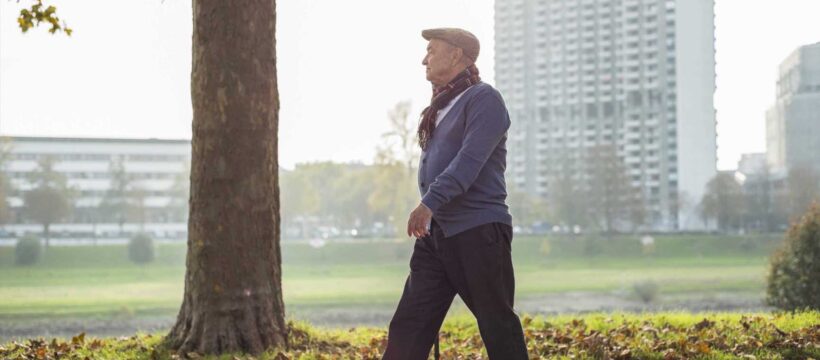THERE are more than 900,000 people in the UK living with dementia.
And as people live for longer, that number is predicted to soar, as getting older is the biggest trigger for the memory-robbing disease.
Dementia is a general term for losing the ability to remember, think or make decisions – to an extent that it interferes with a person's daily life.
Most people with the disease are diagnosed late because tests are complex and symptoms can be vague.
A late diagnosis means sufferers get less time to try possible treatments options and make important decisions about their future.
While memory loss and things like losing your wallet or forgetting to pay bills, missing appointments or getting lost, are all signs of the disease, there are other, less well-known symptoms.
Read more on dementia

Eight ways to sharpen your brain from simple card tricks to clever app

Bruce Willis can 'barely speak' as health takes a turn in dementia battle
New research has found the way someone walks can be an early indicator of the most common form of the disease, Alzheimer’s.
Alzheimer’s disease is responsible for around two thirds of dementia cases in the UK.
This isn't the first time scientists have suggested a change in walking habits, like pace, are an early indicator of dementia more broadly.
"This is because walking requires lots of thinking"Prof Gill Livingston, a psychiatrist at University College London, told Sun Health.
Most read in Health

Popping Viagra could slash risk of killer disease

Vets warn of ‘spike’ in dog poisonings after pets absorb common drugs from owners

Our boy died of a ‘tooth infection’ after his 9th birthday – don’t miss the signs

Strain of flesh-eating parasite which causes agonising ulcers takes hold in US
"You don't just walk, you have to walk in space filled with things you need to avoid, in a certain direction all while keeping yourself balanced.
"People who suffer from dementia, even in the early stages, can't accurately do all these things at once," she explained.
1. Worse sense of direction
Everyone gets lost occasionally, it's part of life – especially if your phone runs out of battery.
But losing your sense of direction regularly could be a sign of the Alzheimer’s, especially in the early stages.
The new study carried out by a team at UCL and published earlier this month, discovered people with the disease “overestimated turns” and had a worse sense of direction when retracing their steps.
According to Prof Gill, this is not just because people with the condition lose their memory – they also lose their perception of the world around them.
She said: "People with early-stage Alzheimer’s can struggle to understand objects properly so they see things as 3D when they're not, or even 2D when actually 3D,
"It means they see objects which aren't there, which can force them to walk in a new direction while trying to avoid it.
"Or it means they can fall over things they think are flat.
"On top of that, they can't remember things they've seen previously, so getting back to places can be hard."
2. Slower pace
We all have different walking speeds, some of us lagging behind more than others.
But walking progressively slower each year could be an early sign of dementia, Prof Gill told Sun Health.
"As the cognitive ability declines thinking gets slower," she said.
"And this means it takes sufferers longer to think about where they are going how to get round objects and coordination, which slows them down."
A large Australian study, which looked at the walking speeds of over 17,000 adults over age 65, found those whose pace fell by fiveper cent or more annually were most likely to develop dementia, compared to those whose walking speed didn't change.
3. Smaller strides
People who suffer from dementia are also more likely to have smaller strides when walking, studies have shown.
US research published in 2016, found smaller steps and wider gait – where a person walks with their feet abnormally far apart – were signs of a decline in memory.
But so far, experts don't know why these walking patterns are common among people with the disease.
"The guess is that people with dementia are less confident about where they're going and their ability to get there," Prof Gill explained.
"So they take smaller steps, like someone would on a slippery surface."
4. A change in arm swing
How a person swings their arms while they walk could uncover a sign of dementia, experts have suggested.
Several studies have found moving the arms less while walking is an early warning sign of the condition.
Read More on The Sun

Rain doesn't stop me from drying my clothes outside – my method's tried & tested

Quality Street fans mourn 'part of Christmas gone' after Nestle makes change
According to Prof Gill this is because those with dementia"struggle" to keep balance while on the move.
"To try and stay upright and maintain balance sufferers tend to use swing their arms more but keep their arms closer to their body."
Other signs and symptoms of dementia…
DEMENTIA affects a person’s mental abilities
This can include:
- increasing difficulties with tasks and activities that require concentration and planning
- depression
- changes in personality and mood
- periods of mental confusion
- difficulty finding the right words
Source: NHS
Source: Read Full Article

